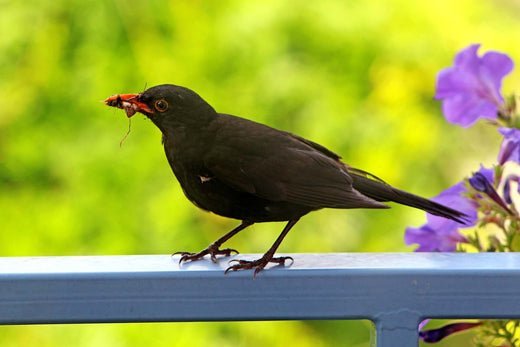
Spring bird feeding
Share
Bird feeding is an enjoyable hobby and is suitable for all age groups. From young children with their first bird feeder to a bird feeding veteran we can all gain real pleasure in knowing that we are helping our local wildlife.
It’s a hobby that takes us through our whole life, and through the whole year, with each four seasons bringing its own delights.
Spring is a special time of the year for watching birds in your garden, as they start to prepare for the breeding season.

The winter gives way to spring, and as daylight hours begin to lengthen this tells the male songbird to embark on his courting. From early spring you will notice your garden birds increasing the volume of their song – a sure sign that they are singing to find a mate.
Robins and blackbirds build nests and lay eggs earlier than other birds, so they may even have young chicks by early spring. Others won’t start nesting until later in the season and will then be joined by millions of migrant birds that arrive here from all around the world. This makes spring one of the most interesting times for garden birdwatching – spotting the comings and goings of summer migrants.
When the summer heat is on, birds still need our help! In fact, they need more help now they have a family to feed.

Even before youngsters arrive, parent birds are busy building nests and so find it hard to find the time to feed themselves. That’s where we can help. Try feeding Original Wild Bird Food or Huskfree Advance – both ideal bird seed mixes for the summer months.
As summer turns into autumn then bird feeding is just as essential.
From September onwards a change in animal behaviour can be seen. The drop in temperature triggers bird migration so look out for birds like Swallows leaving and Fieldfares arriving.
You can help your garden birds by feeding high-energy suet. Our suet contains premium fat and is full of wholesome ingredients that add extra calorific value. Tits are especially attracted to suet balls. Suet is available in a range of different formats, such as insect suet pellets and nuggets. This makes them appealing to many birds including robins and dunnocks.
A good seed mix is worth the investment.

Haith’s Huskfree Advance with Suet Pellets is always a good choice during colder months due to the added benefit of suet. Suet is one of the best products that can be purchased for garden bird feeding when temperatures start to dip.
All too soon autumn becomes winter – the traditional season for garden bird feeding.
Winter can be a wonderful season for attracting birds into your garden if you provide the correct conditions that wild birds need to survive.
Cold temperatures, unforgiving storms and little food make the winter the harshest season for wild birds. Feeding the birds is relatively easy, though. And it doesn’t take a big investment to get started. Whatever you do, ensure the food offerings you present are free of dirt and debris as dust can damage a bird’s respiratory system.
Your birds are safe with Haith's bird food, however. All of Haith's bird foods are super-clean and blended with great care to help wildlife thrive.
Our advice is to feed birds all year round as they come to rely on the food that we provide. One day without food can make a big difference to a small bird.
It’s crucial in winter - more than any other time of the year - to keep your bird feeders full and clean. The benefit – a garden full of colourful and delightful feathered friends to brighten up a dull and dreary winter’s day.

One of the single finest seeds you can buy for feeding garden birds is Sunflower Hearts.
Sunflower Hearts appeal to so many garden birds – no wonder they’ve overtaken peanuts as the number one garden bird food of choice. They’re worshipped by Goldfinches who, in some parts of the UK, prefer them to Niger Seed. We're unsure why some charms of Goldfinch seem perfectly happy to feed on sunflowers rather than Niger Seed and vice versa. It's one of life's mysteries. Our best guess is that some birds instinctively understand that Niger also has tonic properties - something bird-keepers have known for many years.
Sunflower Hearts can be fed on their own or mixed with other seeds.
They are super versatile and provide high calorific value and high-energy to keep garden birds healthy. They're universally well-known for keeping bird feeding simple yet effective. The sheer number of birds they appeal to is sensational, which is why they feature in many of our high-energy bird seeds.
Sunflower Hearts begin life as a normal sunflower and are de-husked mechanically and as they are 100% edible it should mean no waste. Making them great value for money too!
There are really two reasons why bird feeding is so popular. Enjoyment for us and garden bird survival but it also helps us get closer to nature. Not only is it great for our physical and mental well-being but for people that live in urban areas it may be the only wildlife they have a chance to interact with.
So, we urge you to hang out a bird feeder in your garden or on your patio not only for the benefit of your local garden birds but for your benefit too.
Written by Angela

